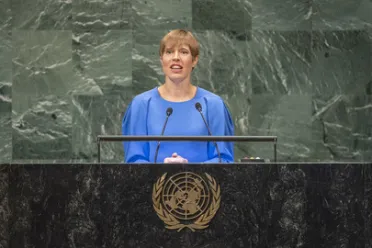Statement
Statement summary
KERSTI KALJULAID, President of Estonia, noting that her country is running for a seat at the United Nations Security Council, said that: “Small countries have no time for small objectives. Our aim is, among other issues, to bring all things digital to the United Nations and Security Council.” Cyber risks are something Estonians as citizens of a fully digitized State understand better than most and her country can offer a perspective to make sure that human beings remain safe.
In the heart of Europe, ongoing military aggression in eastern Ukraine continues, she said. Parts of Georgia and the Crimean peninsula remain occupied. There is no resolution of the conflicts in Africa. While her country contributes humanitarian aid, practical assistance and peacekeepers, it often feels like it is never enough. Estonia reached an agreement on the Global Compact for Safe, Orderly and Regular Migration, but such an accord needs implementation or else it is hollow. The same applies to the Paris Agreement on Climate Change. “We are still not dealing with root causes,” she said.
In terms of efficiency, she noted the importance of truly effective multilateralism, and due to its inclusiveness, this Organization holds great legitimacy. On Security Council reform, there needs to be more space for common ground, with people and States, both big and small, feeling that the Security Council acts in their best interests. For too often, the Council has fallen victim to internal differences and clumsy procedures. It is critical that the Council not be rendered powerless, especially when mass atrocities are being committed.
Information and communications technology can revolutionize entrepreneurship, education, employment and healthcare, she noted. Digital online services provide economic growth and bring down barriers between citizens and the State. New technologies should be seen as enablers, creating new opportunities if supported by proper policies. However, no new technology can thrive in a fragmented world. Now more than ever, global free trade as an essential element of fostering long‑term development and growth is needed.
Because, now more than ever, the international community is connected and dependent of each other, it cannot afford to be self-centred or ignorant, she emphasized, adding that “we all need to see the bigger picture”. Such empathy can be translated into efficiency if there is a desire to get things done, and although words are important, they need to be followed by concrete actions. “We have equal responsibility to be more proactive in preventing and solving the challenges of our times,” she said.
Full statement
Read the full statement, in PDF format.
Photo

Previous sessions
Access the statements from previous sessions.
